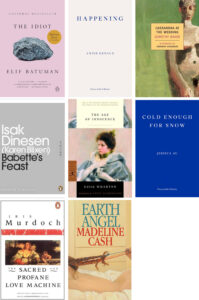Another eight books in March, for which I’ve written some short reviews.

My favorite book
It is Cassandra at the Wedding, by Dorothy Baker.
The story is about titular character Cassandra’s spiral into sabotage, resentment and self-destruction, as a fuck you to her twin Judith’s decision to marry, which Cassandra reads as an abandonment of their shared destinies as two parts of their inseparable whole.
It’s hard to say that she redeems herself in any way. What I appreciated about the book was Baker’s characters, living in intense inner turmoil against the serene, luxurious backdrop of their gated mansion with a private swimming pool. I loved being in the bubble of the Edwards family’s world, and sincerely sympathising with the main narrator’s dysfunction even when you know she’s quickly losing her grip on reality.
It reminded me of the 1969 film La Piscine, also featuring intense psychological tension and a swimming pool. I highly recommend you watch it and to also read this book, I’m sure you’ll see what I mean.
Short reviews
The Sacred and Profane Love Machine by Iris Murdoch was painful. A good book and not the ending I expected. It’s human and hits you in tender places, whose existence you wish you weren’t reminded of.
I thought I would enjoy The Idiot, by Elif Batuman more than I did. I couldn’t get a grasp of the main character as a person. I felt like I was looking through our narrator, Selin’s eyes but there was no real consciousness behind them. Is that the point of the book? I honestly couldn’t tell you.
The Happening, by Annie Ernaux. It was fine. Short.
Babette’s Feast, by Isak Dinesen (Karen Blixen). 19th century Denmark about small villages, pilgrimmage and the happy, small, shared moments of life. Feel-good, Charlie-Brown, Christmas type of book.
The Age of Innocence, by Edith Wharton. Two characters (both separately partnered) struggle against the societal and moral standard of late 19th century New York to not cheat. Having committed to their respective partners too young, neither can see themselves honouring their previously-declared commitments. It does reflect on themes like social capital, expected conformity, finicky human nature and hypocrisy.
But I also disliked the characters’ justifications for their behaviour, which made every chapter with them a drag. The ending made up for the story.
Cold Enough for Snow, by Jessica Au. Little vignettes into the author’s life, triggered by moments in a trip with her mother to Tokyo. I thought I would be reading more about a mother-daughter relationship, so I felt a bit misled. I enjoyed the writing though.
Earth Angel, by Madeline Cash. Someone on goodreads described this book as “What it feels like reading Twitter for the first time” and that is the perfect description. Funny and awful!
